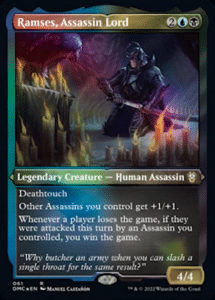Dominaria United Spoiler Season has been incredibly explosive. Just a day ago, we hadn’t had a single spoiler card in weeks. Over one day, we have dozens of them! Of all the spoiler cards released, one stuck out the most. That’s because this spoiler card stoked a discussion about player collusion ruining the whole point of the card. Can an effect like Ramses, Assassin Lord, actually work in Commander?
Ramses, Assassin Lord

Ramses, Assassin Lord, is the Victory Dragon from Yu-Gi-Oh! that MTG has been missing. If an Assassin you control attacks a player who loses the game in the same turn, Ramses will allow to win the game, essentially killing three players for the price of one in Commander.
Unfortunately, the nature of Ramses’ ability causes a lot of problems. When one player’s death affects the whole table, player collusion threatens to have a heavy impact. Conceding before Ramses gets the chance to attack can out the Ramses player a win against the table. While casual Commander groups can make up their minds on how to approach this one, competitive Commander has been becoming more popular over time. Cassius Marsh is even hosting a tournament where the winner gets MTG’s most expensive card ever!
How to Fix Salt From Ramses
Just to address a few things that have popped up about my boy Ramses, Assassin Lord and concessions. Join me, won't you????? pic.twitter.com/E8Lz0bUqOM
— Jim Lapage (@JimTSF) August 18, 2022
Any card with ‘you win the game’ in its text is bound to attract attention from many players, and Ramses is no exception. Soon after its spoiling, Commander Advisory (they make decisions on the Commander Ban list) group member and Spike Feeders member Jim Lapage took to Twitter to address growing concerns about player collusion with Ramses’ ability.
2) In a competitive setting, events need to have a policy that addresses collusion, because there are a LOT of opportunities to collude in Commander.
— Jim Lapage (@JimTSF) August 18, 2022
If they have a policy, it'll cover the opportunities that this card might present. Here's a sample:https://t.co/3WBUyQ1Yex pic.twitter.com/0YFpI3So5z
To begin, Lapage introduces a little rules sample for players looking to concede to Ramses in the future. If an Assassin attacks you and you concede in response, Ramses will still win the game. The Assassin could go and kill itself for all Ramses cares. It doesn’t matter how you die, but if an Assassin that the Ramses player owns attacks you on the turn you die, Ramses wins.
The second point here is what some MTG players are concerned about. Ramses spoiling is being used to highlight a much bigger issue with competitive Commander as a format. As this way of playing the game slowly becomes more popular, play groups that go to tournaments will have opportunities to participate in kingmaking. This means that these players can scheme to do unsportsmanlike actions to raise the chance of someone in their group winning the game. Things can go a lot further here since these play groups can agree to split up any prizing that the king wins between players in the group.
Lapage has referenced an example of a possible rule that could be implemented for Commander tournament play to address this concern. There is obvious room for improvement here, but it is a start. Here’s what it reads:

Commander Social Etiquette
There are opportunities to do this frequently in commander. You can concede to deny draws from Edric, treasures from Dockside, or life from Grey Merchant. This never increases your chances of winning and has a high probability of pissing people off. I don't recommend it.
— Jim Lapage (@JimTSF) August 18, 2022
To round things off, Lapage uses Ramses’ spoiling to touch on another more significant problem with the Commander format. One player’s concession has a chance of negatively impacting the game state depending on the intention behind it. Suppose one player is hoarding a bunch of cards that Dockside Extortionist to trigger off of, for example, and the table knows there’s a good chance that the Dockside trigger could win the game. In that case, the table should (as long as they can’t stop it) allow the line to play out and shuffle up for round two. Suppose the one player decides to concede in response to Dockside Extortionist on the stack. In that case, those artifacts and enchantments may not be counted, which would ruin the Dockside player’s line and significantly change the game’s outcome for a bad reason.
While I choose not to play with these people after it happens once, should this be a common issue in your playgroup, you may want to consider coming up with some ground rules. Maybe the table can decide that giant impact cards like Dockside Extortionist are not fun, or three players can convince the fourth that leaving mid-trigger is incredibly detrimental to the playgroup overall. This is, after all, a social problem, as Lapage puts it. You should treat it as one.
Commander is a Social Game
Even for competitive players, Commander should first and foremost be a social game. Honestly, if you’re hellbent on competitive integrity, there are better formats to play. Assassin tribal isn’t exactly a powerful archetype, and the chances of Ramses becoming a Commander menace isn’t too high, in my opinion. That said, I may look into building a Ramses deck myself, as I enjoy unintuitive win conditions when playing Commander.
Here is a summary of everything MTG to catch up on from August 18 so far:


